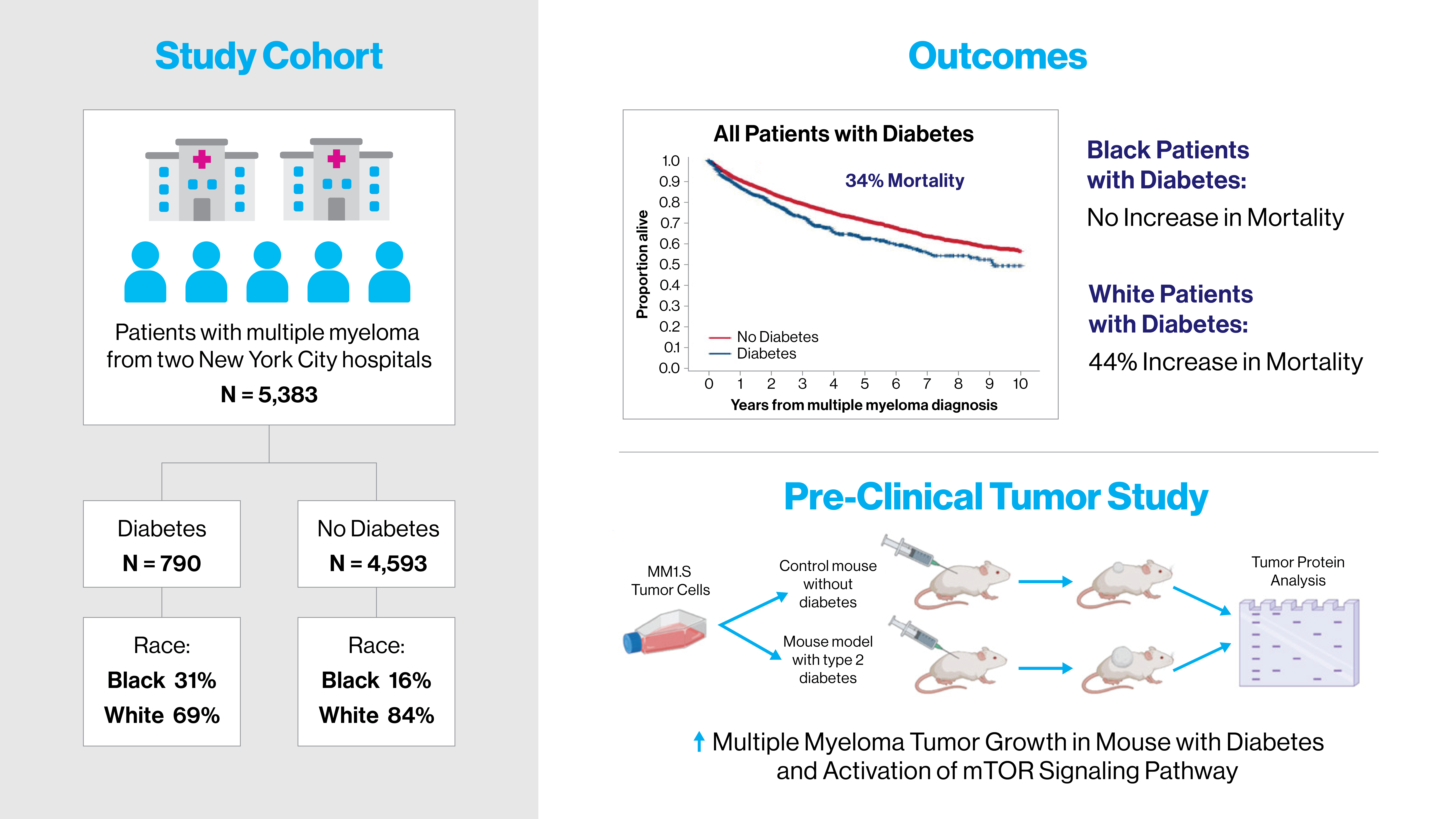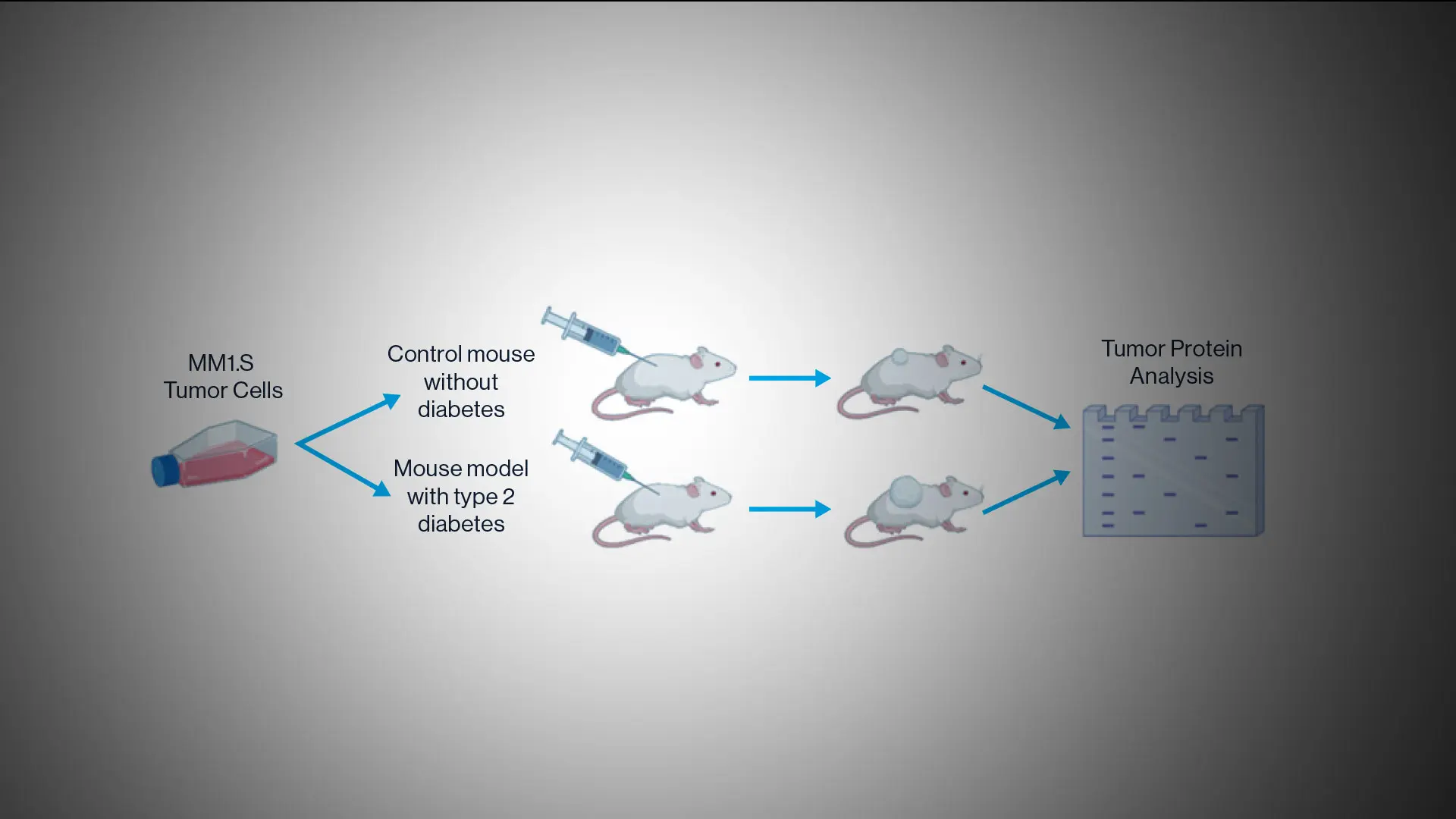Patients with multiple myeloma (MM) who also have diabetes have reduced overall survival when compared to those without diabetes. However, in a subgroup analysis, this difference in survival due to diabetes was seen in white patients but not in Black patients, according to a study published in September 2023 in Blood Advances.
Multiple myeloma is twice as common in Black individuals compared to white people, and diabetes disproportionately affects Black patients. While numerous studies have shown a correlation between diabetes and MM, this has not been studied in the context of race and in-vivo mechanisms. To investigate this further, Mount Sinai and Memorial Sloan Kettering Cancer Center conducted a retrospective clinical study of 5,383 patients with MM, of which 15 percent had diabetes. The rates of diabetes were much higher in Black patients of whom 25 percent had diabetes, while 12 percent of white patients had diabetes.
Multivariable models showed reduced overall survival for patients with diabetes. This appeared to be driven by a marked difference in overall survival between white patients with and without diabetes but not Black patients. In contrast, obesity was associated with better overall survival in Black patients, but not white patients.
To complement the analysis, the team assessed MM growth in a genetically engineered immunocompromised diabetic mouse model to evaluate the mechanisms linking diabetes and multiple myeloma. It found that MM xenografts grew more rapidly in these diabetic mice, compared with nondiabetic control mice. Researchers also found that an insulin-related signal—phospho-S6 ribosomal protein—was overactivated in the diabetic mice, leading the team to believe that higher insulin levels associated with diabetes may accelerate cancer growth.
“Our preclinical data from mouse models and the known increased risk for multiple myeloma in patients with diabetes suggest that diabetes may be a risk factor contributing to the increased development of multiple myeloma in Black individuals compared to white individuals,” said a senior author of the study, Emily Gallagher, MD, PhD, Associate Professor of Medicine (Endocrinology, Diabetes and Bone Disease) at the Icahn School of Medicine at Mount Sinai. “To our knowledge, this is the first study to show the mechanistic association between type 2 diabetes and multiple myeloma progression.”
“To our knowledge, this is the first study to show the mechanistic association between type 2 diabetes and multiple myeloma progression.”
Emily Gallagher, MD, PhD

The study is the first to investigate the correlation between diabetes and multiple myeloma in the context of race and in vivo mechanisms.
“We knew from prior studies that patients with multiple myeloma and diabetes have lower survival rates,” says first author and senior author Urvi Shah, MD, a multiple myeloma specialist at Memorial Sloan Kettering. “What we did not expect to see here was that diabetes was actually associated with worse survival outcomes among white individuals with myeloma, but not Black individuals,” Dr. Shah says.
Generally, one’s risk of developing diabetes increases with age. Study findings also show that overall survival decreased with age. Notably, however, in this cohort, diabetes was 50 percent more prevalent among Black patients 45 to 60 years old than white patients older than 60. Younger patients may tolerate multiple myeloma treatments better than older individuals, and these differences could explain some of the racial differences investigators observed in survival outcomes.
Of note, the findings do not account for how survival outcomes may be affected by the quality of care patients with diabetes receive. The researchers said more research was necessary on that point. Another limitation was that race was self-reported. Going forward, the researchers aim to identify therapies that stop both the development of multiple myeloma and the overactive insulin signaling pathway they believe may be prevalent in patients with multiple myeloma and diabetes. The team is also investigating how modifiable risk factors such as the microbiome and diet can be altered to improve cancer outcomes, noting that therapies and lifestyle changes can go hand in hand.
“This study showed possible other treatment approaches by modifying patient risk factors: by controlling diabetes with diet or medications,” said another of the study’s senior authors, Samir Parekh, MD, Director of Translational Research in Multiple Myeloma and co-leader of the Cancer Clinical Investigation program at The Tisch Cancer Institute at Icahn Mount Sinai. “This may be important in addition to multiple myeloma treatment for long-term outcomes, as well.”
Featured

Emily Gallagher, MD, PhD
Associate Professor of Medicine (Endocrinology, Diabetes and Bone Disease)

Samir Parekh, MD
Director of Translational Research in Multiple Myeloma
